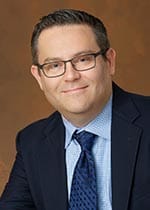Aerospace Alumni Dr. Richard Hofer Elected AIAA Fellow
3-time alumni recognized for his extensive contributions towards Hall thruster technology
3-time alumni recognized for his extensive contributions towards Hall thruster technology

The American Institute of Aeronautics and Astronautics (AIAA) has elected Dr. Richard Hofer, a three-time alumni of Michigan Aerospace, as a member of the Class of 2024 AIAA Fellows. Dr. Hofer has been recognized internationally for his impactful contributions to the advancements of Hall thruster design and engineering, as well as his pioneering leadership in Electric Propulsion.
AIAA, the world’s largest aerospace professional society, selects one Fellow for every one hundred twenty-five Associate Fellows each year. The most qualified candidates are then endorsed by the AIAA Honors and Awards Committee and approved by the AIAA Board of Trustees. AIAA states, “The evaluation is based on the candidate’s technical/management contributions and accomplishments, service to AIAA and other aerospace professional societies, and endorsement letters as well as several committee meetings and discussions.”
“I am profoundly honored and deeply humbled to be inducted into the AIAA’s 2024 class of Fellows, a distinction of the highest order. To find my name among those of many childhood heroes and luminaries in the field of aerospace is the pinnacle of my professional career,” commented Dr. Hofer. “This recognition not only marks a milestone but also reaffirms my commitment to advancing the frontiers of aerospace through my research in electric propulsion and efforts to implement the technology on programs of national importance.”
Dr. Hofer received his BSE in Mechanical Engineering and his BSE, MSE and PhD degrees in Aerospace Engineering from the University of Michigan in 1998, 2000 and 2004, respectively. Additionally, he was a Graduate Student Researcher in the Plasmadynamics and Electric Propulsion Laboratory (PEPL) under the guidance of previous College of Engineering Dean, Alec Gallimore. Hofer’s contributions to Hall thruster technology began with his PhD dissertation in 2004, where he was the first to demonstrate Hall thruster designs that attain efficient operation at high specific impulse.
“From the foundation of my undergraduate years to being at the forefront of Hall thruster research as a graduate student, Michigan Aerospace taught me to think like an engineer and provided me the world-class education I would need to be a successful professional,” he stated.
Currently, Dr. Hofer serves as Principal Engineer and Supervisor of the Electric Propulsion (EP) group at NASA’s Jet Propulsion Laboratory (JPL) at the California Institute of Technology. Since joining JPL in 2005, Hofer has made numerous advancements that have transformed Hall thruster technology in the United States, opening new avenues for deep-space missions previously considered unobtainable.
These advancements have included him establishing a high-power Hall thruster program at JPL that, in collaboration with U-M and the Air Force Research Laboratory (AFRL), led to the design of the H6 Hall thruster, the world’s most efficient xenon thruster. He has also co-led a research project at JPL which successfully implemented and validated magnetic shielding in the H6, leading to significantly extending its lifetime. This work has since been integrated into several NASA Hall thruster designs that are now being flight qualified and, again in collaboration with U-M and AFRL, led to the design of the magnetically shielded H9 thruster. The H6 and H9 have been highly successful as a common platform for collaborative research across the country that have been the subject of dozens of PhD dissertations at U-M, UCLA, and Georgia Tech.
Additionally, Dr. Hofer co-invented the conducting-wall magnetically shielded Hall thruster, set to redefine the global standard for electric thrusters. Later, he served as Principal Investigator of a Strategic Initiative at JPL, playing a critical role in qualifying the XR-5 Hall thruster for JPL missions and establishing the critical system functionality for the SPT-140 Hall thrusters that are now flying on NASA’s Psyche mission. Hofer also served as NASA’s Thruster Lead for the Hall Effect Thruster with Magnetic Shielding (HERMeS) technology development and the subsequent Advanced Electric Propulsion System (AEPS) flight qualification program. The AEPS Hall thruster is scheduled to fly on NASA’s Power and Propulsion Element as part of NASA’s Artemis program in the next few years.
Thanks to his dedication to Hall thruster technology, Dr. Hofer continues to propel the aerospace industry forward with new, exciting advancements. This distinguished honor recognizes his pioneering work and passion for the aerospace industry. He now joins an elite group of just 2,064 distinguished individuals who have been recognized with this distinction since its inception in 1934.
The induction ceremony for the Class of 2024 will take place on Tuesday, May 14, in Washington, DC, followed by celebrations during the AIAA Awards Gala on Wednesday, May 15, at The John F. Kennedy Center for the Performing Arts in Washington, DC.